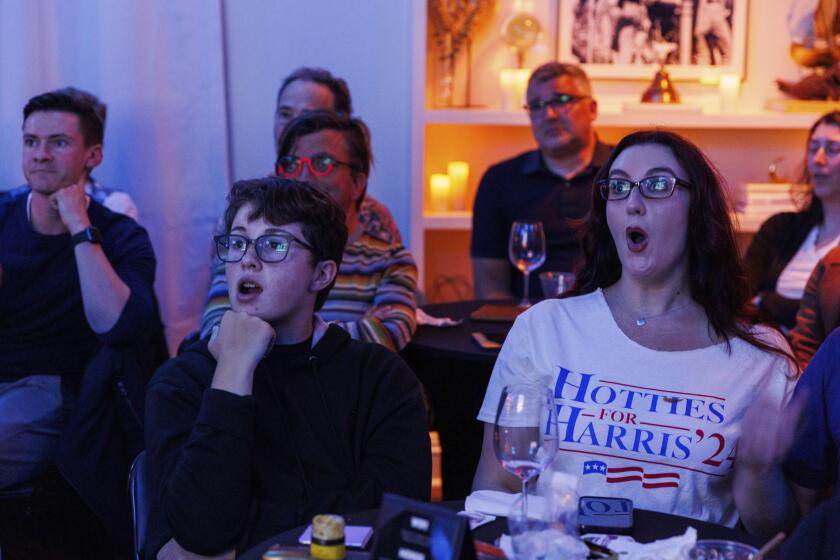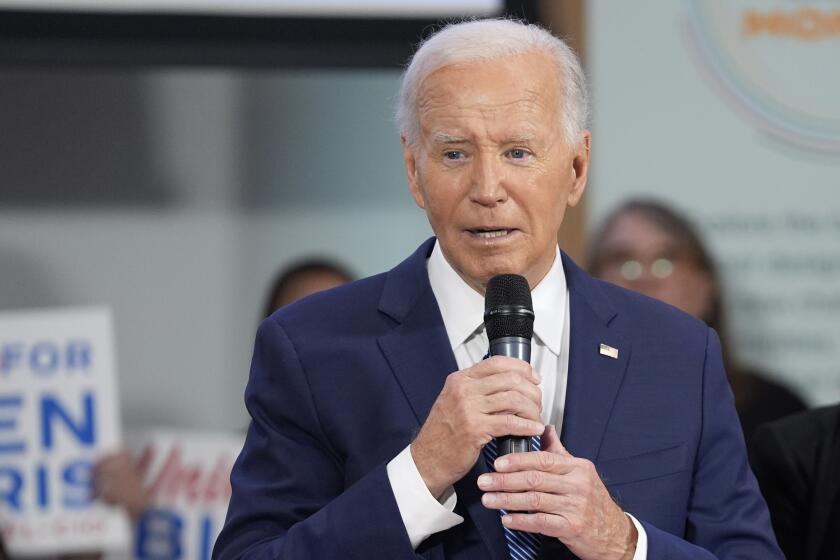Starr Takes Long Day’s Journey Under Lights
In theory, Kenneth W. Starr appeared before the House Judiciary Committee on Thursday as a prosecutor, called to advise Congress whether the evidence supports the impeachment of President Clinton.
But in practice, Starr was the defendant, pinned for more than 11 grueling hours in a hard wooden chair as Democrats sought to break him down and win admissions of wrongdoing.
The charges against the president of perjury, abuse of power and obstruction of justice--the allegations that ignited the impeachment debate--came up, but seemingly in passing.
Instead, the issue of the day was the owlish-looking Starr, who blinked and smiled blandly as the panel’s 16 Democrats assailed him as partisan, unfair, even strangely obsessed.
“While an independent counsel can and should pursue a case with vigor, I and many others believe that Mr. Starr has crossed that line into obsession,” said Rep. John Conyers Jr. of Michigan, the panel’s ranking Democrat, setting the tone for his colleagues’ interrogations.
Conyers likened Starr to “a federally paid sex policeman spending millions of dollars to trap an unfaithful spouse.” His colleagues, following one by one, assailed Starr--some with prosecutorial solemnity, others in theatrical rage--for his investigators’ harsh treatment of Monica S. Lewinsky, and for writing a report that omitted evidence in the president’s defense.
In return, Starr was almost ethereally unflappable--patiently fielding most questions, deflecting others by denying knowledge of some of his staff’s past actions, smiling incongruously at the most furious attacks.
“We’re trying to be helpful,” he told Conyers mildly.
At the end of the day (and night--the hearing lasted past 10:30 p.m. EST), the match seemed largely a draw. Starr suffered no knockout punch and landed none of his own.
But this was a late battle in a long war, and the war may already be decided. With public opinion solidifying against impeachment, the hearing room’s passions seemed slightly academic, like a moot court exercise.
A CBS poll released Wednesday found that 70% of the public opposes impeachment and 67% want Clinton to finish his term. Republican members of the House, who read such polls carefully, acknowledged privately that impeachment appears less likely every day.
Still, what was at play in the marathon hearing was an ancient Washington contest sometimes called the “frame game.” In any public controversy, framing the question can be the most important battle.
Starr Seeks to Refocus Story
Starr and his somewhat-muted Republican supporters sought to refocus the story of the president and the intern on the charge that brought it to the independent counsel back in January, nearly a lifetime ago in scandal-years: whether the president lied under oath and whether he should be removed from office because of it.
“The evidence suggests that the president made false statements under oath and otherwise thwarted the search for truth. . . . “ Starr said. “That is not a private matter.”
To which some Democrats replied, in effect: So what?
“It’s clear that the president lied when he testified before the grand jury, not to cover a crime but to cover embarrassing personal behavior,” said Rep. Charles E. Schumer (D-N.Y.). But “lying about an extramarital affair should not lead to the removal of a duly elected president from office,” he said.
Instead, the Democrats sought to focus attention on what they said were flaws in Starr’s investigation as an additional reason that the charges against the president should not be taken seriously.
“It is fundamental to the integrity of this inquiry to examine whether the independent counsel’s evidence is tainted, whether conclusions are colored by improper motive. . . . “ Conyers said. “These are not collateral issues at all.”
Abbe David Lowell, the fiercely intense Washington lawyer who was the Democrats’ chief counsel, provided the most dramatic exchanges of the day with an extended interrogation of Starr. (Hyde had ruled that Lowell would get only 30 minutes to set out the minority’s case, but after his colleagues howled, he relented--as he apparently planned all along--and gave the lawyer more than an hour.)
Lowell accused Starr of sending Congress “a referral with an attitude,” rather than an impartial accounting of the evidence. He said that Starr had won jurisdiction over the Lewinsky issue under dubious circumstances because he failed to warn Atty. Gen. Janet Reno that he had previously advised attorneys for Paula Corbin Jones, the Arkansas state employee whose sexual misconduct lawsuit against Clinton led to the perjury charge. That drew a partial acknowledgment of error from Starr: “Fault my judgment, if you will, but it just frankly did not occur to me, as I think happens to a lot of us in life.”
Lowell chided Starr for failing to stop Linda Tripp, the woman who taped Lewinsky, from taking her evidence to Jones’ lawyers. (Some Clinton defenders have charged that Starr thus knowingly allowed Jones’ attorneys to trap Clinton into perjury, although Lowell did not explicitly make that argument.) Starr replied that he did not know that Tripp was talking with the Jones lawyers, so it never occurred to him to forbid it.
And Lowell sprang a Perry Mason-style trap when he asked whether Starr’s investigators, when they questioned Lewinsky for the first time, had discouraged her from calling a lawyer.
“That is correct,” Starr replied. “We would not encourage someone who was involved in felonies, as we thought at the time, to in fact reach out to a lawyer, especially a lawyer who had assisted her in crafting a perjurious affidavit. Why would we possibly do that?”
“Well, one reason would be because the rules of the Department of Justice--the law of the land, as decided by the Supreme Court and the Code of Federal Regulations--require it,” Lowell responded triumphantly.
The Democratic counsel then quoted the investigator who interrogated Lewinsky, Michael Emmick, as saying in a speech, three or four years before: “It is never OK to continue to ask questions after the person has said he wants his attorney there.”
Starr Briefly Taken Aback
For once, Starr appeared taken aback, but only momentarily.
Lewinsky eventually was allowed to call several lawyers, he said. “So the idea that she was not, in fact, permitted the opportunity to try to consult with counsel is incorrect,” he said.
Later, under questioning by Clinton’s private lawyer, David E. Kendall, Starr appeared to lose his temper momentarily--when Kendall accused him of “massive leaking” to the press.
“I totally disagree with that,” Starr snapped. “That’s an accusation and it’s an unfair accusation.”
The district judge overseeing Starr’s inquest has launched a formal investigation into complaints by Kendall that the independent counsel has leaked secret grand jury information to the media.
Kendall, needling Starr, noted that the judge had accepted 24 separate allegations of leaks and decided that they merited investigation.
“And I think you know the answer to that,” Starr replied, noting that “the burden [is] on the prosecutor” to prove that alleged leaks did not come from his office.
Republicans came to Starr’s defense, but their main function seemed to be as corner men, to towel him off and give him breathers between successive rounds of Democrats.
Rep. James E. Rogan (D-Glendale) said that the bout reminded him of one of his early cases as a local prosecutor.
The defense attorney “attacked me personally . . . called me all kinds of names,” he said.
Eventually, he said, the defense lawyer explained: “If we have a good case, we go after the law and the facts; and if we have a bad case, we go after you.
“Judge Starr and his office, for the last year, have essentially been treated like a pinata,” he said. “So I’m glad the American people have now had at least an opportunity to view the facts of this case from the prosecution office in context.”
More to Read
Get the L.A. Times Politics newsletter
Deeply reported insights into legislation, politics and policy from Sacramento, Washington and beyond. In your inbox three times per week.
You may occasionally receive promotional content from the Los Angeles Times.










